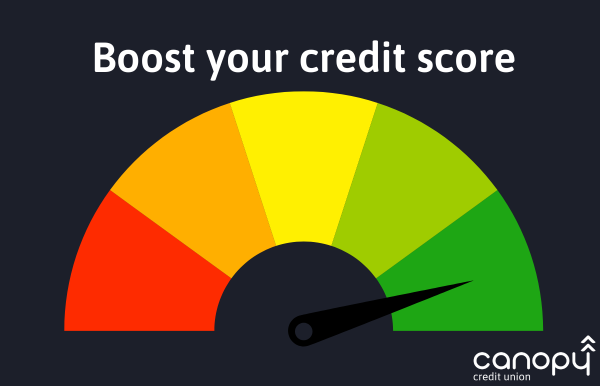Boost Your Credit ScoreBoost Your Credit Score
DO YOU WANT TO BUY A HOME, GET A STUDENT LOAN, FINANCE A NEW VEHICLE, REMODEL THE BASEMENT, OR MAYBE USE A CREDIT CARD TO CHARGE BUSINESS EXPENSES? HAVING A HEALTHY CREDIT SCORE IS IMPORTANT TO BORROWING MONEY.
Applying for a loan or credit card to finance a purchase is essentially asking a lender to trust that you’re going to pay them back according to the terms you agree upon. Landlords, insurers, and employers often use credit information to filter out applicants they may deem too risky. While it may not seem fair in some cases, lenders often see your credit score as a sign that the rest of your life is well managed and that you “take care of your business.”
At Canopy, we know you are more than your credit score. We are passionate about giving chances to people who have been turned away from other financial institutions because of factors like poor credit.
However, we believe that empowering members to learn about finances will help them continue to grow. Being educated on the ins and outs of credit scores is a crucial step towards financial wellness.
Who decides my credit score?
In the United States, there are three credit reporting agencies. Experian, Equifax, and TransUnion. Each reports and calculates your score differently.
What’s a good credit score?
Credit scores range from 300-850. This is the breakdown:
Excellent: 780-850
Good: 660-779
Fair: 600-659
Unfavorable: 500-599
Deficient: 300-499
Why does having good credit matter?
There are many benefits to having good credit. Many areas of life from lending to Employment benefit from good credit. Having good credit improves access and lower cost for:
- Borrowing needs
- Housing – whether renting or buying
- Transportation
- Insurance: auto insurance premiums can sometimes increase more for having poor credit than having an at fault accident on your driving record.
- Communication Services
What makes up a credit score?
Your credit score is calculated by the credit reporting agencies with five factors. Each factor is weighed differently to make up the total score, with some factors like payment history mattering much more than credit mix.
TransUnion breaks down these five factors this way:
- Payment history: 40% — the most important factor is to pay your bills on time. Don’t be late. Don’t miss payments. Setting up automatic payments can help with making sure you are always on time.
- Credit utilization: 23% — credit utilization is based on the overall amount of money you’ve spent on your credit cards or accounts that have credit limits. In order to look “less risky” to lenders, don’t use more than 30% of your total available credit across all your accounts. Doing so may indicate that you’re dependent on borrowing or simply overspending based on your income and ability to pay back. Pay down balances as much as possible each month. To keep within under 30% utilization, pay off cards multiple times a month or spread payments out on a variety of cards.
- Example: Alex has three credit cards. The first card has a limit of $1,000, the second a limit of $2,000 and the third a limit of $5,000. Together, her available credit is $8,000. To make sure she stays under a 30% utilization for her $8,000, Alex pays off her cards if she gets close to or above $2,400 in combined purchases across her cards.
- Length of credit history: 21% — the longer your credit history, the more data is available to show creditors that you’re a good risk and you’ve proven it over time. Keep any credit cards you have active by making a purchase on each one every few months. Inactive accounts might be closed by the lender, which can reduce your average credit age and lower your credit score.
- Credit mix: 11% — maybe you’re paying a mortgage, have paid off an auto loan, and pay off your credit card balance each month. The ability to manage a variety of types of credit adds points to your score.
- Recent credit inquiries: 5% — creditors checking your credit before making a lending decision, can hurt your scores. It’s usually temporary but can cause your score to fall a few points. Wait at least 6 months between hard credit inquires. Soft credit pulls (like checking your credit score on a free website) does not effect your credit score as it is more of a guess rather than a precise number.
To learn more on how to Boost your Credit Score, please check out Credit Score Boost
